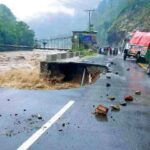ISLAMABAD, Jan 28 (APP):Haphazard urbanization in developing countries is a result of the policies that left cities to grow organically resulting in huge slums, tangled traffic, large greenhouse emissions and sprawling suburbs.
This was observed by the Prime Minister’s Adviser on Institutional Reforms and Austerity, Dr. Ishrat Husain at the opening session of the two-day International Workshop on Sustainable Cities: Issues of Rapid Urbanization.
Dr. Ishrat Husain said by 2050, with the urban population more than doubling its current size, nearly seven of ten people in the world will live in cities.
The majority of the additional three billion urbanites would be concentrated in Asia and Latin America.
It is expected that over 80 percent of the urban population added in the next 15 years will be found in middle-income countries such as China, India, South Africa, Nigeria, Indonesia and Pakistan, he observed.
Dr. Ishrat said cities and metropolitan areas are powerhouses of economic growth, contributing about 60 per cent of global GDP.
However, they also account for about 70 per cent of global carbon emissions and over 60 per cent of resource use. Over 1 billion people live in slums and this number keep rising.
South Asia’s policymakers, the World Bank report says, face a choice: continue on the same path or undertake difficult and appropriate reforms to improve the region’s trajectory of development, he said.
Once the required investments and partnerships are in place, sustainable cities have to be equipped to perform the five major functions to meet the challenges of the future including economic development, social development, urban governance and environmental management, he said.
The workshop is being organized by COMSTECH from January 28-29 at its Secretariat in Islamabad. COMSTECH is the key Science and Technology advisory body of the Organization of Islamic Cooperation (OIC).
The workshop includes a large number of local and foreign experts from academia and industry, company executives, and developers from OIC Countries to discuss how policies, technology, and best practices can trigger transformations towards smarter cities.
Experts from Turkey, Malaysia, Oman, Jordan, Afghanistan and Egypt are participating besides a large number of participants from local public and private organizations.
Speaking on the occasion, the Chairman Higher Education Commission (HEC) and the Acting Coordinator General of COMSTECH Dr. Tariq Banuri traced the history of the idea of sustainable development and the challenges the world now faces not only from finite resources but global warming.
He pointed out that increasing urbanization was now an inevitable phenomenon of growth but there are various models to address the incumbent challenges.
These include such notable efforts as practiced by Pakistan’s own Dr. Akhtar Hameed Khan and Arif Hasan that build on the notion of community ownership of urban social projects.
Earlier, Dr. Khurshid Hasnain, Adviser COMSTECH welcomed the participants and appraised the audience of COMSTECH’s efforts for capacity building and network formation between scientists and technologists of OIC member States.
The workshop will be having a total of seven sessions and speakers include Dr. Kaiser Bengali, Dr. Shahid Mahmood of Interactive Group, Zafar Iqbal, Director Planning CDA besides experts from local and World Green Building Councils, among others.







